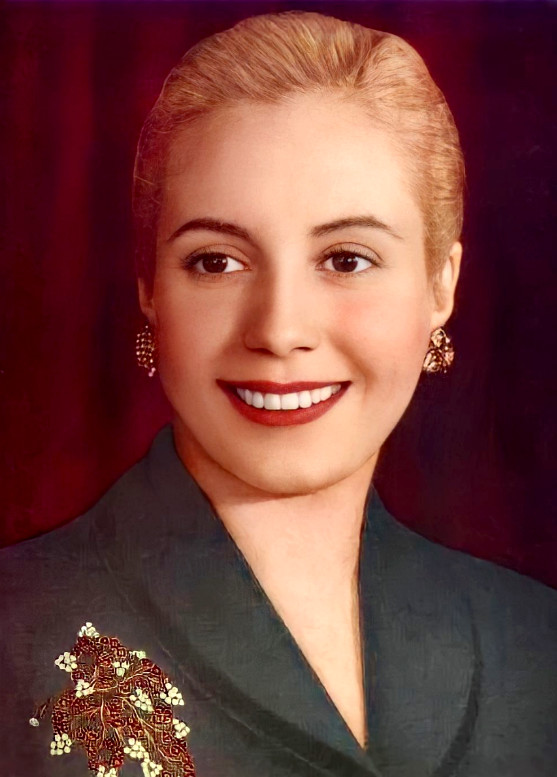Eva Perón
 María Eva Duarte de Perón (; ; 7 May 1919 – 26 July 1952), better known as Eva Perón or by the nickname Evita (), was an Argentine politician, activist, actress, and philanthropist who served as First Lady of Argentina from June 1946 until her death in July 1952, as the wife of Argentine President Juan Perón. She was born in poverty in the rural village of Los Toldos, in the Pampas, as the youngest of five children. In 1934, at the age of 15, she moved to the nation's capital of Buenos Aires to pursue a career as a stage, radio, and film actress. She married Perón in 1945, when he was still an army colonel, and was propelled onto the political stage when he became President in 1946. She became a central figure of Peronism and Argentine culture because of the Eva Perón Foundation, a charitable organization perceived by many Argentinians as highly impactful.
María Eva Duarte de Perón (; ; 7 May 1919 – 26 July 1952), better known as Eva Perón or by the nickname Evita (), was an Argentine politician, activist, actress, and philanthropist who served as First Lady of Argentina from June 1946 until her death in July 1952, as the wife of Argentine President Juan Perón. She was born in poverty in the rural village of Los Toldos, in the Pampas, as the youngest of five children. In 1934, at the age of 15, she moved to the nation's capital of Buenos Aires to pursue a career as a stage, radio, and film actress. She married Perón in 1945, when he was still an army colonel, and was propelled onto the political stage when he became President in 1946. She became a central figure of Peronism and Argentine culture because of the Eva Perón Foundation, a charitable organization perceived by many Argentinians as highly impactful.She met Colonel Juan Perón on 22 January 1944 during a charity event at the Luna Park Stadium to benefit the victims of an earthquake in San Juan, Argentina. The two were married the following year. Juan Perón was elected President of Argentina in June 1946; during the next six years, Eva Perón became powerful within the pro-Peronist trade unions, primarily for speaking on behalf of labor rights. She also ran the Ministries of Labor and Health, founded and ran the charitable Eva Perón Foundation, championed women's suffrage in Argentina, and founded and ran the nation's first large-scale female political party, the Female Peronist Party.
In 1951, Eva Perón announced her candidacy for the Peronist nomination for the office of Vice President of Argentina, receiving great support from the Peronist political base, low-income and working-class Argentines who were referred to as ''descamisados'' or "shirtless ones" (similar to the term “sans-culottes” during the French Revolution). Opposition from the nation's military and bourgeoisie, coupled with her declining health, ultimately forced her to withdraw her candidacy. In 1952, shortly before her death from cancer at 33, Eva Perón was given the title of "Spiritual Leader of the Nation of Argentina" by the Argentine Congress. She was given a state funeral upon her death, a prerogative generally reserved for heads of state.
Eva Perón has become a part of international popular culture, most famously as the subject of the musical ''Evita'' (1976). Cristina Álvarez Rodríguez has said that Eva Perón has never left the collective consciousness of Argentines. Cristina Fernández de Kirchner, the second female president of Argentina (after Juan Perón's third wife Isabel Perón), claims that women of her generation owe a debt to Eva Perón for "her example of passion and combativeness". Provided by Wikipedia
